
Arquivo para February, 2022
Covid: slight drop in deaths and protocols
After several highs and stability in the number of deaths, this weekend saw the first drop in “known cases” as data providers say, as there is no testing policy (in Brazil), so the numbers of infections have also been falling, but for lack of data they are less reliable.
weekend saw the first drop in “known cases” as data providers say, as there is no testing policy (in Brazil), so the numbers of infections have also been falling, but for lack of data they are less reliable.
Vaccination of children and the total number in Brazil the country is also advancing, exceeding 80%, with a significant number of booster doses (30%), but protocols continue to be poorly managed: distancing, crowding and correct use of masks cannot be abandoned. and the next measure announced will be the release of masks in “outdoor” environments.
The number of 722 deaths per day is still high, after all they are deaths and not complicated cases or just unvaccinated people, a phase of well-administered protocols would be reasonable to make this number drop quickly and just go to any event and see that there is no more real concern, and in a political year this is not an accepted measure, for example in commerce.
Long-term Covid is not yet clinically understood and the medical recommendation is to always test, it affects children in a special way (uol’s website “viva bem” cites several cases in Brazil) and it is not present in the concerns of public environments, only masks and alcohol gel is the basic thing, there should be testing, in addition to the protocols that should be observed and are not (distancing, for example, is no longer observed in any public environment and there is no supervision).
It is expected that they will stick to the protocols in Brazil and that the moving average of deaths may drop faster than it has been so far.
Tomorrow we will talk about a second scourge of war, as we said at the beginning of the month, plagues, follow or precede wars and then hunger and social chaos will come, it is incredible that someone hopes or desires for a situation of such inhumanity, tomorrow let us return to the topic with the hope that the announced Russia-Ukraine dialogue will bear fruit.
Can the blind lead the blind?
In a conflict situation, the parties involved must be arbitrated by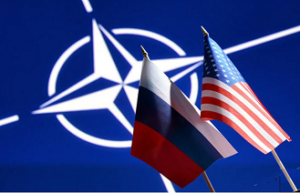 a third party that is neutral, but does not yet exist.
a third party that is neutral, but does not yet exist.
The escalation of the war between Ukraine and Russia continues this Friday morning, Russian tanks approach Kiev as Ukraine’s defense troops resist as best they can with anti-tank attacks and bridge explosions, such as the one on the Teteriv River, that hamper the arrival of the Russians in Kiev, they also managed to hit some tanks with anti-tank batteries.
The Ministry of Defense of Ukraine informs that the Russian tanks would already be 32 km from the capital, and the objective is the fall of the government and the consequent Russian occupation of the country, the Eastern European allies that are part of NATO: Poland, Lithuania, Estonia and Latvia invoke Article 4. of the NATO treaty that any country affected implies a reaction from the 30 member states.
The entry of NATO would be the beginning of a world escalation of the War, certainly China would position itself in favor of Russia while the USA and its allies outside Europe would position themselves in favor of Ukraine, which is already happening, but Brazil remains in a complicated situation due to the visit of the President of the Republic at an inopportune time to Russia, but the vice president has already condemned the Russian action.
In the early hours of this Friday, the situation in Ukraine becomes dramatic with the possibility of an imminent assault by Russian forces on the Ukrainian capital Kiev, without a reaction from the allies, despite having ceded arms to the Ukrainian army, within hours of occupation of the country can be total.
The security council as we reported yesterday has already spoken out against the Russian advance, although Russian rhetoric says that it was only to keep the peace and previously that it would not invade Ukraine, it is already known that they are just war rhetoric.
Who would be the forces, countries and people capable of convening an emergency diplomatic meeting, the sanctions imposed on Russia’s banks hit three of Putin’s allies in this financial market: Gennady Timchenko, Boris Rotenberg and Igor Rotenberg.
Another sanction was the interruption of the Nord Stream 2 gas pipeline that is ready and connects Russia with Germany, Putin accused the coup saying that this will make the price of gas soar and Europe depends on it.
But the central problem remains, who can give light to a dialogue between the blind, as the biblical reading says that alludes to the fact that a blind man cannot guide a blind man, and adds (Lk 6, 42): “how can you say to your brother?: brother, let me take the speck out of your eye, when you don’t see the beam in your own eye? Hypocritical! First take the log out of your eye, and then you will be able to see clearly to take the speck out of your brother’s eye.”
It’s not about the supporters of a football match, but about human lives and the rights of peoples and nations that are at stake, there is no supporter that has light but the one that wants peace, the sides in conflict, that I allude to Biden and Putin, must accept some kind of moderation to avoid a world war, or the return of the cold war.
Beyond geopolitics, a world view
The lack of global vision, the idea of a cosmovision that overcomes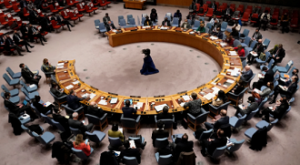 blindness has been addressed in several fields of philosophy, comes from the myth of the cave philosophy of Socrates and Plato, where here what men see without being in the light are just shadows of what is really the world, more modernly Heidegger expanded it to the “Weltanschauung” (a kind of worldview or worldview, but every translation is poor), a fundamental view because it stops seeing the world in a bipolar or unipolar way to see it as a everything that includes being, everything that exists beyond a particular way of seeing the world, including nature and the cosmos.
blindness has been addressed in several fields of philosophy, comes from the myth of the cave philosophy of Socrates and Plato, where here what men see without being in the light are just shadows of what is really the world, more modernly Heidegger expanded it to the “Weltanschauung” (a kind of worldview or worldview, but every translation is poor), a fundamental view because it stops seeing the world in a bipolar or unipolar way to see it as a everything that includes being, everything that exists beyond a particular way of seeing the world, including nature and the cosmos.
In terms of everyday life, this is fundamental both in the so-called “natural philosophy” (although it is vitiated by contemporary idealism), which includes so many fundamental values, those that already exist in international law (right to life, religious and cultural , etc.) expanding the world of mere ethics and morals to existential values, those where beyond the human condition are the rights of peoples and nations that have a certain way of being and living.
For this, a vision of the world is needed that goes beyond the limits of nationalism and the selfish desire for domination of peoples, decolonization, the limitation of the power of the superpowers and a truly effective role for the UN, which must go beyond the mere Union of Nations, in order to true unity and peace among peoples.
We quote the book The plague of Camus, when he worked clandestinely in the newspaper Combat in the fight against Nazism he wrote> “Letters to a German friend” (1945), which reads: “Letters to a German friend” (1945): there were feelings common issues such as separation or fear, but continued to put personal concerns at the forefront. Nobody had yet truly accepted the disease”, in this case not a plague, but the war, we have already posted here the relationship between them, and now we relate it to the fear that is existential.
No one else but the Ukrainian people feels this today, but Germany and the UK are already involved, the president of Ukraine has already met with Lithuania and Poland, also the Russians, USA and China and all of Europe feel it in a way, but they will say It’s not me, it’s the neighbors, that’s what Camus’ Letter warns, it’s not the neighbor, in addition to the economic sanctions that will already have an impact on the world economy, the expansion of the bipolarization of tension is already spreading little by little: the plague.
The relationship with the virus is similar, it gradually enters, one, two, dozens and then hundreds of contaminated people, until it becomes a war-cide, a general war if not in terms of war, it would be a disaster due to nuclear weapons, in existential and worldview terms, there are no limits to hate speech, a hate is a hate, a not peace.
That it is possible to see beyond conflicts, the existence and the right to life of peoples and nations, and that conflicts remain within the limit of diplomacy (in pictured UN Security Council meeting).
.
On War and Blindness
It is always blind or just egocentric that inability to look at the Other, they want your attention just to demand their gifts and accomplishments, so they are egocentric, but social and cultural blindness is broader, in it lies the inability to accept different cultures and peoples, they say they do not constitute a relevant group or do not have an advanced culture, where the issue of advancement depends only on the referential, the most common in both cases is to claim the other’s gaze on themselves, without there being reciprocal.
they want your attention just to demand their gifts and accomplishments, so they are egocentric, but social and cultural blindness is broader, in it lies the inability to accept different cultures and peoples, they say they do not constitute a relevant group or do not have an advanced culture, where the issue of advancement depends only on the referential, the most common in both cases is to claim the other’s gaze on themselves, without there being reciprocal.
The essay on blindness by José Saramago, which we have already posted here, talks about this social blindness seen as a virus that spreads and begins to blind everyone, and which was turned into a film by Brazilian director Fernando Meirelles, with a screenplay by Don McKellar, and we call it our post-essay of Intermittencies of Death, another essay by Saramago.
Camus also described in his novel The Plague, about a disease that hit his native country (he was Algerian) and that saw that there comes a time when the truth seems to offend everyone, even the once sensible: “but there comes a time in the story in which anyone who dares to say that two and two make four is punished with death” because it is “an idea that may make you laugh, but the only way to fight the plague is honesty”, this forgotten and even ironic virtue nowadays.
Camus says that overcoming fear and pain “I understood that all the misfortune of men came from not having a clear language. So I decided to speak and act clearly, to put myself on the right path”, this implies not only wisdom and courage, but also overcoming human blindness.
In a more forceful passage the author will say: “Men are more good than bad, and in fact that is not the point. But they are more or less ignorant, and this is what is called virtue or vice, the most desperate vice being that of ignorance, which thinks it knows everything and then authorizes itself to kill”, but then there is hatred and war.
This seems to be a path of no return that we are walking, not just on the lit fuse in Ukraine and Russia, but in all humanity, the blindness of the time of the wars seems to have returned in full and everyone is pointing the finger at each other, and Karl Klaus warned journalists who were also riding the wave: “War, at first, is the hope that we will get along well; then there is the expectation that the other will get screwed; then, the satisfaction of seeing that the other did not do well; and finally, the surprise of seeing that everyone was screwed.
The Bible also does not lack this metaphor: the blind Bartimaeus who begs for sight, for the healing of the man born blind (incredible because he did not have a cognitive system to see) and went to wash himself in the pool of Siloam and the two blind men of Galilee, is It is clear to most theologians that this cure is to see the truth that men refuse to see: Love and Peace.
The regional and national polarizations are gradually becoming global and the feeling that the other is going to “get screwed” is the growing and pure blindness, we will all get screwed.
Possible agreements and impending conflict
Attacks that took place over the weekend in the separatist regions Donesk and Lugansk could undermine diplomatic possibilities around Ukraine, both Ukraine and Russia through the separatists want to establish territorial boundaries before a possible agreement, but tests carried out with rockets with nuclear charges in the border region are more provocative than they seem, while Russia recognizes the so-called People’s Republic of Donetsk and People’s Republic of Lugansk.
Donesk and Lugansk could undermine diplomatic possibilities around Ukraine, both Ukraine and Russia through the separatists want to establish territorial boundaries before a possible agreement, but tests carried out with rockets with nuclear charges in the border region are more provocative than they seem, while Russia recognizes the so-called People’s Republic of Donetsk and People’s Republic of Lugansk.
News agencies reported on Monday that “the president said he plans to sign the relevant decree in the near future”, referring to the recognition of the breakaway regions and informed leaders Emmanuel Macron (France) and Olaf Sholz (Germany) of his intentions. .
With this, the Minsk protocol that established a balance of forces in the three lithium regions, as Crimea was also part of that agreement, seems to be broken and Moscow’s expansionist objective is clear, now with defined objectives, Ukraine must give up part of its territory for the People’s Republics, and Crimea is not even mentioned being therefore a region already considered annexed to Russia, the doubt now is whether the Kremlin’s wishes stop there, the troops on the borders show no sign of limits.
The calculations of American intelligence analysts is that 75% of Russian military forces are dedicated to the conflict, everything suggests that it is not just about tactical support for the rebels of the republics in dispute, now what is expected is the recognition of the countries for this independence, unfortunately, is a sign for all nations and thus makes the conflict world, although the military involvement is still of the forces of NATO and Russia, besides Ukraine it is clear that it is not yet a member of NATO.
It is possible for diplomacy to act, it is always possible even on the verge of a war, what lies ahead with bombers in the Donesk and Logansk region is an internal civil war, if both NATO and Russian troops get involved in the fragile limits of pacification can quickly break apart.
Russia is not closed to diplomacy, but the announcement of a reconnaissance action is clearly a request for Ukraine to retreat, while there are military accusations from both sides.
It may seem like a local conflict, but let’s remember how the conflicts of the first and second wars were born, which were for dominance in border regions and which seemed only local problems.
It will be with strong diplomacy in this region that a worldwide escalation can be avoided.
Covid-19 situation is undefined in Brazil
While bets on a fall in Covid-19 continue, we emphasize that it would be safer to think about a second semester in relation to protocols in particular for distancing, the death chart shows a blur this month (see chart), and the study on the new omicron variant BA.2 are still in their infancy, and the WHO is investigating other subvariants, although BA.2 has been the main one in the increase in new cases, in the state of São Paulo 3 cases have already been detected.
it would be safer to think about a second semester in relation to protocols in particular for distancing, the death chart shows a blur this month (see chart), and the study on the new omicron variant BA.2 are still in their infancy, and the WHO is investigating other subvariants, although BA.2 has been the main one in the increase in new cases, in the state of São Paulo 3 cases have already been detected.
It is being called a “stealth omicron” (stealth) because it manages to escape vaccines, with lower severity, but the subvariants are still being studied, both the severity (which for now is lower, but still lethal), while if observes in this month of February the Ômicron is dominant and an increase of those of the subvariant BA.2.
While most studies point to less seriousness, scientists from Japan from the University of Tokyo, Kumamoto, Hokkaido and Kyoto point out that the subvariatne may be more aggressive than the original, because it affects the lungs more severely, and we already know that this has been the case. more serious factor, and therefore called SARS-Covid (SARS, Severe Acute Respiratory Syndrome).
Kei Sato, a researcher at the University of Tokyo who conducted the study, argued that the most important thing at this point would be to monitor more closely and “establish a method to detect BA.2 specifically would be the first step” in many countries, as we had already posted. have a “new” testing policy in this case.
Many cases are not counted because there is no mass testing and many are asymptomatic.
If we look at the data from Denmark where BA.2 cases are very high (data from Our World in Data) we observe that the number of hospitalized (almost 1,500, 33 in ICU) and deaths (33), is a reference if not we take care to avoid a new generalized infection, once the omicron is spread, despite the authorities not reacting.
We continue to ask for a clearer protocol, with distance and a policy of avoiding agglomerations, but it seems that for political reasons this has been abandoned.
Love enemies and avoid wars
Last week we talked about how famine, pestilence and wars were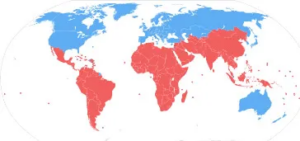 closely correlated, in yesterday’s post we showed how the “division” of Europe was in the post-war period, the first North African countries that were under France (Libya and Tunisia) and Spain (Morocco), and we discussed the wars that still take place there due to phosphate mining.
closely correlated, in yesterday’s post we showed how the “division” of Europe was in the post-war period, the first North African countries that were under France (Libya and Tunisia) and Spain (Morocco), and we discussed the wars that still take place there due to phosphate mining.
Virtually all of Africa was colonial, except for Liberia and Ethiopia, the latter, which is still the headline of famines and wars, is now joined by Somalia, which was an Italian colony, in the post-war period Russian influence in the liberation struggles increased. influence in several regions, such as Angola, Mozambique and Guinea Bissau, but practically all of Africa enters this boiling process, and the allied forces that had formed the United Nations, Japan defeated in the war had to recognize the independence of Korea (until then unified) and the concession of the Kuril Islands to the Soviet Union, but which have recently fueled tension between Russia and Japan.
So the United Nations was not able to promote independence without big and bloody wars in Africa, some still persist, decolonization is just a new way of dependence, just as in America dependence on ideological struggles, these cultural and internal, never allowed real peace and an end to the cold war.
The fall of the Berlin Wall and the dissolution of the Soviet Union, with several countries becoming independent and returning to their original culture, it is a mere illusion to think that they are buried by ideologies, it seemed to give rise to a world where political, cultural and religious diversity would be tolerated, although the Arab tension never happened, the Arab Spring was an encouragement, but the forces that are still alive within these nations are still operating vigorously, see tensions in Libya, Congo, Sahara and many others, too Latin America is experiencing a polarization sometimes to one side and sometimes to the other.
The economic and political strength that China has gained, the new geopolitical influences of Russia, the tension between the north and the poor south, the crises of the democracies all seem to accelerate a process of establishing a New World Order, some more fatalistic currents call it for the acronym NOM, but in fact all this is just the boiling of issues that the post-war period has not resolved, the United Nations is still not what it promised to be a real “concert of nations” that live in peace and negotiate conflicts.
So we live a bipolar tension in many ways, north-south (photo), colonies and colonizers, ideological tensions that act today more internally than externally, and a pandemic that accelerated this whole process, if the world could be polarized it could be unipolar, there is a positive perspective that would be the real “concert of nations” and a bad one that is the polarization in one of the perverse factors that have already acted on humanity.
How to live with such huge cultural and political differences, a principle of friendship or peace that is always threatened is not enough, it is necessary to accept and defend diversity, to overcome the concept of “enemy” in the form of hate and intolerance (we wrote several posts to explain this), what in terms of Christian culture is called “loving your enemy”, says the reading Lk 6:27-28: “I say to you who hear me: Love your enemies and do good to those who hate you, bless those who curse you, and pray for those who slander you”, in other words neither unipolar nor bipolar, but a multipolar world.
Hate and Intolerance in History
It is necessary to know the historical process to understand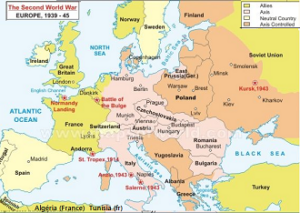 the bases on which a world polarization and an alleged new world order, a very vague term and subject to many interpretations, which led to polarization in the period of the Cold War and which seems to return with new molds, where the leaven of hate can flourish.
the bases on which a world polarization and an alleged new world order, a very vague term and subject to many interpretations, which led to polarization in the period of the Cold War and which seems to return with new molds, where the leaven of hate can flourish.
The reasons that led to the formation of the Axis, an alliance with the Nazis in World War II, were: territorial expansion with the creation of empires based on military conquests and the overthrow of the post-First World War international order, and the destruction and neutralization of Soviet communism.
Germany and Italy signed 1st. November 1936, a week after announcing a friendship pact, the creation of the Rome-Berlin Axis and then on November 25, 1936 the Anti-International Communist Pact (Comintern) in opposition to the Soviet Union, Hungary, Bulgaria and Slovakia joined the Axis in November 1940, later Croatia joined, Finland joined the USSR in 1941 and in April of that year Yugoslavia was invaded and dismembered by Axis forces and then the Soviet Union.
At the beginning of the war, in 1st. From September 1939, the allies were France, Poland and the United Kingdom, as well as the states dependent on the British Crown: India, Australia, Canada, New Zealand and South Africa, after the invasion of Belgium, in addition to the Netherlands and Greece joined the allies, the Soviet Union supported the invasion of Poland, but realizing that it would be betrayed by the Nazis, it also became an ally, the United States would fully enter the War after the attack on Pearl Harbor (7 December 1941 ), supported with money and weapons until then, in December 1941 it became an allied member with troops and sending heavy weapons to Europe.
China has had a protracted war with Japan since the Marco Polo Bridge Incident in 1937, which was an incident of the disappearance of a soldier and troops stationed on either side of this bridge that is close to Manchuria (the disputed region), so China officially joined the Allies in 1941.
With the Axis practically defeated, the Tehran Conference was held with the first territorial divisions of the occupation troops in each country, this is important to understand the Soviet advances constituting Eastern Europe, the D-Day of the disembarkation of the troops in Europe was held in December 7, 1941.
The Potsdam and Yalta conferences were held on July 17 and August 2, 1945, respectively, before the bombing of Nagasaki and Hiroshima on August 6 and 9.
Two attitudes must be analyzed in the post-war agreements, one is the reintegration of German territory to the war in the limits before the first war, with the exception that the place where the former Königsberg was after Stalingrad and today Kaliningrad was taken by the USSR and the Germans. were expelled, the negative was the nuclear bomb on Nagasaki and Hiroshima when the war was practically over, and the effects of the bomb marked the history of mankind forever, dropped in August 1945.
In the next post, we will analyze the advance and the almost end of the cold war and what can cause an imbalance and create a New World Order, an acronym used in different ways.
Tolerance, War and Peace
It grew even more in the midst of the pandemic, which forced 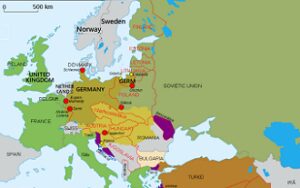 us into involuntary seclusion, a kind of intolerance to the Other, what in current philosophy has been called the exclusion of the Other, Habermas, Paul Ricoeur, Emmanuel Lévinas among others wrote about it, and more currently Byung Chul Han.
us into involuntary seclusion, a kind of intolerance to the Other, what in current philosophy has been called the exclusion of the Other, Habermas, Paul Ricoeur, Emmanuel Lévinas among others wrote about it, and more currently Byung Chul Han.
In the Enlightenment, Voltaire had already written something similar in his “Philosophical Dictionary”: “What is tolerance? It is the prerogative of humanity. We are all full of weaknesses and errors; let us mutually forgive each other our follies, such is the first law of nature.” (VOLTAIRE, 1978, p. 290)
At the time the book was banned from circulation in France such was the intolerance between Catholics and Protestants, and it was this that led Voltaire to call them maniacs.
The Illuminist affirmed that “without tolerance” the world would continue to be disordered, as he continued, and radicalizes it by saying: “the best way to reduce the number of maniacs, if there are still any, is to entrust this disease of the spirit to the regime of reason, which slow, but infallibly enlightens men” (idem), he believed this because it was characteristic of the spirit of enlightenment and religion in his time, due to the division between the Christians of the Reformation and the Catholics, were intolerant, contrary to the gospel they preached about forgiveness. and mercy.
On the religious question, John Locke changes the argument to defend religious tolerance, starting precisely from the separation between State and Church and establishing different functions for each of these institutions, as well as their own powers to carry out their due functions, but it took two wars. for the concept to mature.
The issue of religious tolerance was established in the Westphalian Peace Treaty, historic for international relations, which were actually two treaties in the German cities of Münster and Osnabrück, in 1648, putting an end to the so-called Thirty Years’ War (1618-1648) in which religious disputes led to inter-kingdom struggles.
The Declaration of Principles on Tolerance was adopted on November 16, 1995 by UNESCO Member States, it states that tolerance is neither indulgence nor indifference and suggests “respect and appreciation for the rich variety of cultures of the world”. world and forms of expression”, taking a different look at different cultures and religions.
Voltaire’s maniacs can now be translated as fanatics, defenders of territories and power, motivations of the first and second world wars, where the territories led to tensions between the Triple Entente (also known as Allies: France, United Kingdom and Russia) and the Triple Alliance (which were the Central Powers: Germany, Italy and the Austro-Hungarian Empire), the reduced territories of Germany and the expanded territories of Russia and France, the region of Alsace-Lorraine will be disputed by Germany) will fuel the future second world war , and these poorly made treaties will lead to new territorial disputes, see the case of Finland (which was established as neutral towards Russia) as the case cited in Putin’s recent conversation with Macron about the current Ukraine crisis, which could be a kind of “Finnish solution”, in the last hours there was a small withdrawal of troops from Russia in frontiers.
Any treaty now needs to have secure foundations, the idea that a “new world order” is underway hides expansionist desires and political intolerance.
References:
VOLTAIRE. (1978) Dicionário Filosófico. 2 ed. Trad. Marilena Chauí. São Paulo: Abril Cultural, (Collection: Os Pensadores, Thinkers).
LOCKE, J. (2019) Carta sobre a Tolerância (Edição bilíngue Latim-Português) Tradução Fábio Fortes e Wellington Ferreira Lima. Organização, introdução, notas e comentários Flavio Fontenelle Loque Belo Horizonte: Autêntica Editora.
Tension hours for peace
The President of Ukraine Voldymyr Zelenskiy said yesterday (14/02)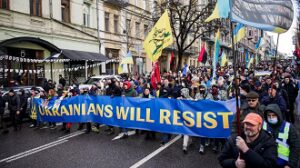 that he heard that Wednesday will be the fatal day for a possible Russian invasion, and called the people to “unity” and to demonstrate this day for Ukraine. and for peace, he tries to minimize the possibility of an attack and is willing to make concessions for peace.
that he heard that Wednesday will be the fatal day for a possible Russian invasion, and called the people to “unity” and to demonstrate this day for Ukraine. and for peace, he tries to minimize the possibility of an attack and is willing to make concessions for peace.
On the other hand, Russia also claims to be ready for peace, but contrary to concessions reaffirming its demands, among them the non-inclusion of Ukraine in NATO, which would be a threat to Russian territory, Putin hides what everyone knows about expansionist desires, which in the Russian view is just the reintegration of their territories from the time of the USSR.
The war apparatus on the borders of Ukraine grows, not only to the north on the border with Russia and Belarus, but also to the south in the region of Moldova and in the territory of Crimea that is under Russian possession, but that is claimed by Ukraine, too. in these countries the American diplomatic delegations are being withdrawn.
The pattern of Russian speech is repetitive, just like that of the West (USA, Germany and UK mainly), only France and Ukraine itself admit concessions, on the Russian side there is a list of demands for a possible peace while making the rhetoric that they do not want war, in addition to Chinese support, Argentina as well as its ally Venezuela and the unexpected Brazilian support seems to give strength to Russian desires, Bolsonaro is visiting the country in troubled times.
There will be no peace without concessions, and both the Russian side, which says there is a chance for peace if their demands are accepted, and the Allied side, which says the response will be swift and severe, seem more to be preparing for war than willing to peace.
These are days of tensions, especially for the Ukrainian people, but also for a good part of Europe, Russia has a base of supersonic nuclear missiles Zircon, both in the exclave (discontinuous territory of Russia) and close to Crimea in the Black Sea, these missiles that were tested at the end of last year can reach European countries and are faster than international anti-aircraft batteries, in addition to the issue of carrying nuclear capsules.
Despite having a large army, the Ukrainian army is much inferior in technologies and weapons, NATO support is only strategic, but the people will resist (photo)
Beyond the concessions, it is necessary to understand the insecurities and visions of opposing sides, it is not possible to reach an agreement without the ability to see the “other side”.

